China and Covid19
Chinese Tourists Travel Abroad Again after ‘Zero Covid,’ but Restrictions on Passengers from China Draw Outrage
China opens its gates while other countries introduce travel restrictions on Chinese passengers. Authorities have condemned the measures.
Published
2 years agoon
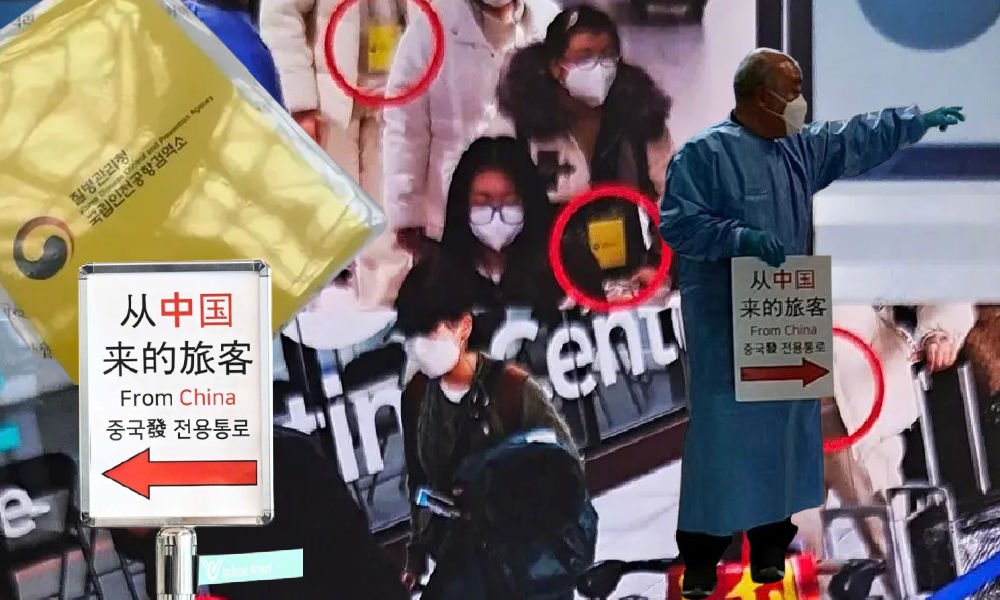
With China lifting blockades on foreign travel, there’s a post-zero-Covid itch to travel. But while many countries say they welcome Chinese tourists, they also implement restrictions on passengers coming from China. On Chinese social media, people respond to these restrictions with anger, fuelled by media reports describing the rules as a form of foreign revenge and discrimination.
Just as China reopened its borders to quarantine-free travel on 8 January, many foreign countries restarted their tourism marketing campaign for Chinese travelers. As China will resume issuing passports for tourism travel, many Chinese are expected to go abroad again after three years of stringent Covid measures.
On the Chinese social media platform Weibo, where many foreign embassies and tourism boards are also active, countries from all over the world have recently started to post photos and videos to promote local attractions and to celebrate the reopening of China’s borders after three long years.
The Weibo account of Spain’s National Tourism Administration (@西班牙国家旅游局) listed the country’s most famous attractions, writing: “For three whole years, Spain has been eagerly waiting for you!” (“整整三年,西班牙终于等到你”). The Israel Tourist Office (@以色列旅游局) also wrote on Weibo: “Let’s travel again, we will see you in Israel!” (“再次启程吧,以色列与你不见不散!”).
“Where would you like to go?” Chinese media outlet People’s Daily wrote, introducing the hashtag “Many Countries Send out Posts to Welcome Chinese Tourists to Come Visit and Travel” (#多国发微博欢迎中国游客到访旅游#), which has since received over 15 million views. In its post, People’s Daily listed the many different countries’ tourists boards trying their best to catch the attention of Chinese netizens, including the boards of France, Thailand, Canada, Australia, New Zealand, Denmark, Norway, the Netherlands, Portugal, Austria, and Switzerland, which have all sent out welcoming message to Chinese tourists.
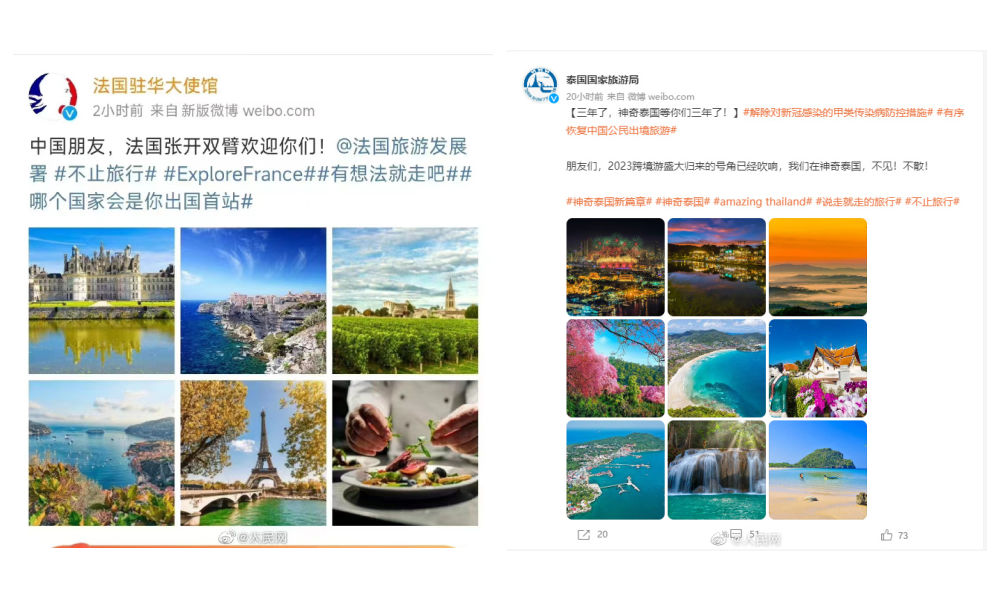
Examples of foreign Weibo accounts promoting their countries (France, Thailand) as the perfect travel destination.
Other Chinese mainstream media presented these welcoming messages as a sign of recognition of China’s Covid policy and its economic recovery from the pandemic.
On January 8th, The Paper (澎湃新闻) published a Weibo post with the hashtag “Many Countries Happy to Welcome Chinese Tourists” (#多国乐见并欢迎中国游客#), stating that China’s revision of its Covid-19 policy has been positively received internationally as it will bring a strong economic recovery that will also boost global economy.
Meanwhile, however, many Chinese netizens do not seem very excited about recent travel invitations from various countries.
Although some Weibo users expressed excitement about being able to travel abroad again, many viewed the China-targeted tourism promotion as a need for Chinese travelers’ money. One commenter wrote: “Let me translate this for you: ‘Foreign countries: Friends from China! We need you to come and develop our economies!'”
Moreover, people criticize some of these countries for lacking sincerity in actually welcoming Chinese tourists. Without waiving visas, these invitations seem like blank checks, especially when arranging a visa for some of these countries is not so easy for Chinese travelers.
Another user replied: “None of them are waiving visa requirements, they want to make money but are not sincere. We’re better off traveling within China.”
‘Discriminatory’ Entry Restrictions on China
Despite the many countries welcoming Chinese travelers, the severity of China’s Covid outbreak has recently led them to impose travel restrictions for passengers from China. Foreign authorities expressed concerns that the number of Covid-positive inbound travelers might impact their own national epidemic situation.
Some countries, such as the U.S., UK, and India, require a mandatory negative Covid-19 test result within 48 or 72 hours before departure for travelers from China. Others, like Japan and Italy, require testing upon arrival and quarantine for those who test positive. South Korea raised the bar for Chinese tourists by requiring a negative Covid test before boarding, another after landing, and quarantine for positive passengers. South Korea also temporarily suspended short-term visas for Chinese nationals. Morroco has even decided to ban entry to all travelers from mainland China from entering the border.
Many Chinese netizens responded to the new restrictions with resentment and anger, partly fuelled by Chinese media reports describing the rules as a form of foreign revenge, discrimination against the Chinese, and political conspiracy.
Using the hashtag “Some Countries’ Newly Imposed Rules Treat Chinese Travelers Differently” (#部分国家新规区别对待中国旅客#), The Paper (澎湃新闻) listed the travel restrictions imposed by the EU, Japan, South-Korea, and Morocco in detail, commenting that Morocco’s banning of Chinese tourists lacks scientific evidence and is purposely targeting Chinese nationals.
The Paper also criticized the U.S. restrictions as “only targeting tourists from China,” and condemned U.S. politicians and media for continuously fabricating the risk of virus mutation and spreading lies about the lack of transparency in China regarding the outbreak.
Social media users also say the new restrictions are discriminating against Chinese, and some call them a “humiliation.”
One Weibo user posted screenshots of a New York Times article in Chinese by author Frankie Huang titled “America’s Covid Test Requirement for Chinese Travelers Is a Farce” (“针对中国的旅行限制是一场闹剧“) (English version). The Weibo user quotes and highlights the article’s argument that the restriction targeting travelers from China is “a policy of racism.” In the article, the author suggests that the U.S. travel restrictions for passengers from China perpetuates “centuries-old tropes of Asians as the “diseased other” and the notion that the coronavirus is, in fact, the “China virus.””
Chinese Travelers Receive “Humiliating Treatment” in South Korea
Other social media users tie the discussion around the restrictions on travelers from China to a broader human rights debate, such as in a recent article titled “Chinese Travelers Received Humiliating Treatment in South Korea: Receive Yellow Cards Which Must Be Hung Around Neck” (“中国旅客遭韩国侮辱性对待:被发放黄色识别牌,要求必须套脖子上”).
In the article, the author, associate professor Wang Jin (王晋) from the Middle Eastern Studies department of Xibei University, accuses South Korea of violating human rights and treating people as “criminals” by only giving Chinese travelers yellow tags to hang around their necks upon landing. This ‘yellow card’ topic also became a much-discussed one on Weibo (#赴韩中国游客一下飞机就被挂黄牌#).

Yellow card given to Chinese passengers landing in South Korea (image via Wang Jin).
The author also condemns practices such as charging fees for Covid-19 testing & quarantine and reducing flights from China for being “disrespectful” and “intentionally thwarting normal cross-border interactions.” In their replies, netizens also echo the author’s argument and condemn high testing fees, uncomfortable quarantine hotels, and violation of Chinese travelers’ privacy.
Some recent viral videos on Chinese social media showed Chinese travelers undergoing isolation after arriving into Jeju Island, with some of them claiming they had gone on a hunger strike to protest the circumstances of their isolation.
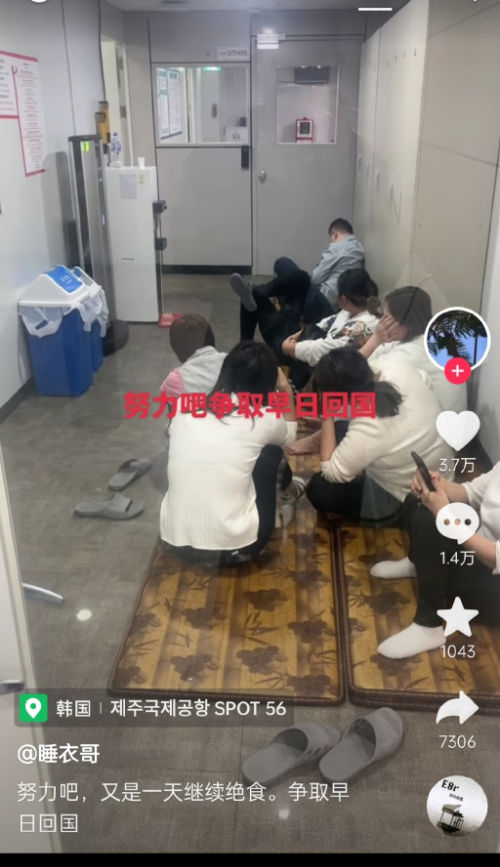
Some see the restrictions that are now implemented internationally as ammunition for counterarguments against those who have been advocating for China’s opening up and supporting foreign countries’ normalization of Covid-19. Under a Weibo post introducing the restriction imposed by Japan, Weibo users flooded the comment session with mockeries such as “sure, foreign countries do not need testing right?”
One popular Weibo comment suggested that the supporters of China ending its Covid restrictions should “bring their A4” [referring to the blank paper protests] to travel overseas.
In China’s current online media discourse surrounding the travel restrictions for Chinese travelers, there is not much reflection from authors on China’s own stringent measures over the past three years and the difficulties experienced by Chinese citizens to exit and enter mainland borders.
A few Weibo commenters, however, do remind others of China’s very recent zero Covid past, including the strict and sometimes complex entry requirements with green codes letter of commitment, recovery documents for those who had Covid, CT scans, and (14+7) quarantine.
On other social media platforms, there are also more discussions which do not necessarily echo mainstream media narratives.
Underneath an article by CCTV News titled “Hypocritical! Some Countries Argued China Should Open Up, Yet Now Restrict Chinese from Coming In” (“虚伪!某些嚷嚷着要中国“放开”的国家,现在却限制起中国人来了”), one comment suggested that “it is not always viable to criticize others; we should self-reflect to progress.” A screenshot of the comment sections shared on Zhihu showed that more voices demanded self-reflection, but that the comment section had been censored.
An Eye for an Eye: China Halts Travel Visas for South Korea & Japan
On January 10th, the two top trending topics on Weibo both related to Chinese authorities suspending short-term visa issuance for visitors from Japan and South Korea. The measure was announced by the Chinese embassies in both countries on Tuesday.
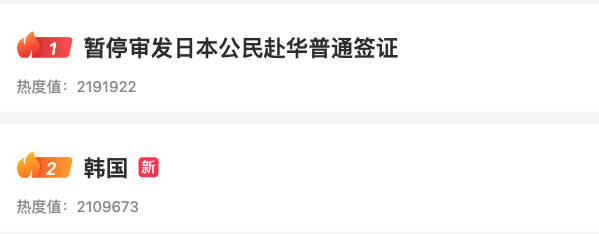

During a regular press conference on Tuesday, China’s Foreign Affairs Ministry spokesperson Wang Wenbin (汪文斌) responded to a question about the suspension of visas, saying: “It is really regrettable that a few countries ignore scientific facts and their own actual epidemic situation, yet insist on implementing discriminatory entry restrictions against China, something which China resolutely opposes and we will [therefore] take reciprocal measures.”
On Weibo, a hashtag related to the press conference also became top trending (#外交部回应暂停签发韩公民赴华短期签证#) and many applauded the measures. One blogger noted: “We welcome every good friend, but we will not show lenience for those who are not good friends.”
The online discussions of the recent news developments also led to many posts containing anti-Korean and anti-Japanese sentiments.
Meanwhile, Thailand has been highlighted in these discussions for the way in which the country has truly welcomed Chinese tourists. Not only did Thai authorities not require any Covid tests or vaccination proof, Cabinet ministers even came to Bangkok’s airport to personally welcome Chinese tourists with flowers and gifts.

A banner warmly welcoming Chinese visitors to Thailand.
“The most welcoming country for us is Thailand,” one blogger wrote, with one Weibo user from Jilin replying: “Why would we want to go to South Korea or Japan at all? To buy things so that we can boost their economy? They’re not worth it.”
By Zilan Qian and Manya Koetse
Get the story behind the hashtag. Subscribe to What’s on Weibo here to receive our newsletter and get access to our latest articles:
Spotted a mistake or want to add something? Please let us know in comments below or email us. First-time commenters, please be patient – we will have to manually approve your comment before it appears.
©2023 Whatsonweibo. All rights reserved. Do not reproduce our content without permission – you can contact us at info@whatsonweibo.com.
Stories that are authored by the What's on Weibo Team are the stories that multiple authors contributed to. Please check the names at the end of the articles to see who the authors are.

China and Covid19
Weibo Watch: Small Earthquakes in Wuhan
How Wuhan is shaking off its past with a new wave of innovation, the hot topics to know, and the Weibo catchphrase of the week: ‘the Three Questions of Patriotism.’
Published
6 months agoon
September 27, 2024
PREMIUM NEWSLETTER | ISSUE #37
Dear Reader,
“Wuhan Earthquake” (#武汉地震#) momentarily became the number one trending topic on Weibo this Friday night, after residents of Jiangxia District reported feeling their homes and buildings shake. “Was there an earthquake, or am I drunk?” some wondered.
I also felt a bit tipsy in Wuhan this month. Neon signs, dancing livestreamers, flying drones, bustling night markets, and holographic lights. On my first night in Wuhan, the lights made me dizzy and I discovered that the city was nothing like I had imagined.
Until now, I couldn’t help but associate Wuhan with the wet market, crowded fever clinics, and China’s first Covid hospitals. As the world watched the pandemic unfold in 2020, Wuhan became instantly famous as an early epicenter of the Covid-19 crisis. It became known as the quarantined city, the city of Dr. Li Wenliang, and the city of the “invincible Wuhan man.” At the time, it seemed like such a monumental event that Wuhan would not recover anytime soon, even after enduring the worst peak of Covid.
Now, over four years later, everything feels different. I felt a rush of energy as I strolled through the lively streets. It was evident that Wuhan is much more than the city that gained global notoriety as the pandemic hotspot. Beyond its vibrant atmosphere, it is making international headlines for its leadership in autonomous driving, having emerged as the world’s largest testing ground for self-driving cars, particularly in unmanned ride-hailing services.
Baidu’s Apollo Go, referred to as Luobo Kuaipao (萝卜快跑) in Chinese, is the driving force behind the robotaxi revolution in Wuhan. Since their arrival earlier this year, they have become a hot topic on Chinese social media, and I was eager to experience it for myself.
(Brief explainer: Luóbo (萝卜) means radish or turnip in Chinese, but when pronounced, it sounds similar to “robo.” Kuàipǎo (快跑) translates to “run fast.” Combined, it creates a playful name that can be interpreted as “Radish Runs Fast” or “Robo Go.” I’ll use ‘Luobo’ here, as it is the most common way to refer to Apollo Go in China and has a cute sound.)
In the areas where the robotaxis operate, people already seem to have become accustomed to the driverless ‘Luobo.’ During a 1.5-hour ride in the unmanned taxi—I took a long journey and then needed to return again—I was surprised to see so many of them on the road. Other drivers, motorcyclists, and passengers didn’t even bat an eye anymore when encountering the new AI taxi.
Currently, there is an active fleet of 400 cars in Wuhan, and Baidu plans to expand this to 1,000 in the fourth quarter of this year. Although these taxis still comprise only a fraction of the city’s entire taxi industry, their impact is noticeable on the roads, where you will inevitably encounter them. I stood at one drop-off point near an urban shopping center for at least forty minutes and witnessed passengers being dropped off continually, with some proceeding their journeys into areas where Luobo doesn’t operate by calling the ride-hailing service Didi from there.
As for the experience itself, it was thrilling to see the steering wheel move with no driver in the front seat. I was surprised at how quickly I adapted to something so unfamiliar. It’s incredibly comfortable to have a car to yourself—no driver, no worries—while you choose your own music (and sing along), set the air conditioning, and relax as the Luobo navigates the traffic.
Even inside the vehicle, Baidu emphasizes the safety of their self-driving cars, providing information about how Apollo Go has accumulated over 100 million kilometers of autonomous driving testing without any major accidents, thanks to a strict safety management system.
If you close your eyes, the experience feels like riding with a regular driver. Luobo speeds up, slows down, and occasionally makes unexpected maneuvers when a car or bike suddenly approaches. It ensures there’s enough space between itself and the car in front. While I can’t say that merging onto the highway or encountering unexpected traffic situations didn’t feel a bit scary, I soon felt at ease and came to rely on the technology.
That said, there are still bumps in the road. Luobo has often been ridiculed on Chinese social media for getting stuck at a green light, stopping for a garbage bag, or struggling to make a U-turn. While riding and observing the robotaxis in Wuhan, I noticed plenty of honking and road rage as Luobo chooses safety first, often appearing sluggish, earning them the nickname ‘Sháo Luóbo’ (勺萝卜/苕萝卜, “silly radish”).
While Luobo might still have its silly moments, it is a serious part of the future. Already, it is popular among commuters for its low cost, privacy, and convenience.
After spending an entire morning riding and watching the Luobos, I excitedly felt like I had experienced a glimpse of the future. Right now, Luobo Kuaipao operates in various cities across China, including Beijing, but it’s still in the testing phase there—none of my friends from Beijing have ever seen or taken one yet. However, this will likely change soon, heavily relying on policy support.
That night, I spoke to a young local in a busy commercial area near my hotel. Like many residents, he was curious about where I came from and what I was doing in Wuhan. (During the four days I spent there, I noticed very few foreign tourists.) We briefly discussed the pandemic; he reflected on the difficulties it brought but treated it as something from the past—just another bump in the road in the city’s long history.
Instead of dwelling on the pandemic, our conversation focused on the future: Wuhan’s robotaxis, his confidence in China’s technology, and the rising importance of his country on the geopolitical stage. He was just one of several young people I spoke to, from shopkeepers to students, who seemed very focused on China’s growth and development and how its technological advancements reflect its position in a world where the U.S. is no longer leading.
When it comes to China’s driverless innovations, they are shaking the foundations of transportation like an earthquake. Besides Apollo Go, companies like Pony.ai (小马智行), WeRide (文远知行), SAIC Motor (上汽集团), AutoX (安途), FAW (一汽), Changan Automobile (长安汽车), BYD (比亚迪), Yutong (宇通), and many other industry players are also working to realize driverless passenger cars, shuttle services, freight trucks, delivery vehicles, public transport buses, and much more.
What we’re witnessing in Wuhan is merely a glimpse into a future under construction, actively promoted by Chinese state media. Over the past week alone, CCTV featured Luobo Kuaipao in three segments as a key example of China’s new technological advancements and the national strategy to build a strong tech-driven economy.
As I left Wuhan in a traditional taxi, I suddenly felt like a time traveler. Wuhan was the birthplace of the 1911 revolution and will also appear in foreign history books as the initial epicenter of the Covid-19 pandemic. Now, it is at the center of an international robotaxi revolution, and it won’t be the same the next time I return.
While my friendly elderly driver—I estimated him to be in his late 50s—honked at other cars, I realized he had witnessed many other revolutions, including the Cultural Revolution as a young boy, the economic reforms, and the major social changes of the 1980s, as well as the digital revolution of the 2000s. With the growth of Wuhan’s robotaxi fleet, his job might be affected, adding another tremor to his city and his life—though he may already be retired by then.
As he helped me with my luggage and wished me a safe trip home at the Wuhan Hankou Station, I couldn’t help but feel nostalgic about how everything always changes and gets shaken up as we move forward into a future driven by technology.
As for Friday’s earthquake in Wuhan—it turns out it was a 1.6. Despite the online interest in the topic, it means virtually nothing in a city where things of much greater magnitude are happening.
If you’d like to know more about my experiences and the slight setback I encountered while searching for Wuhan’s robotaxis, check out the short videos I made here:
Part 1 (also on Instagram)
Part 2 (also on Instagram).
Best,
Manya Koetse
(@manyapan)
What To Know
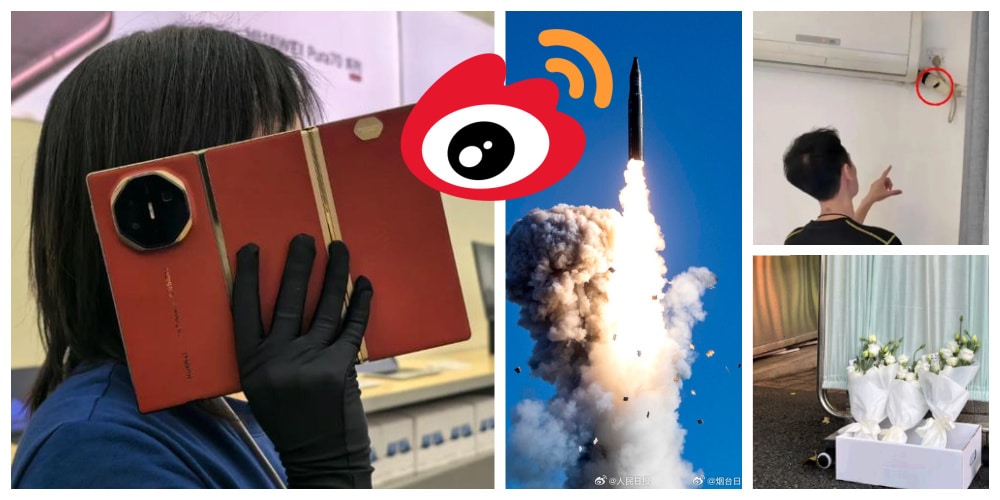
🚀 China’s First Intercontinental Ballistic Missile Test-Launch Since 1980
On the morning of September 25, China announced a successful test launch of an intercontinental ballistic missile (ICBM) carrying a ‘dummy warhead’ into the Pacific Ocean. This marked the first ICBM launch in decades, described by official media as part of routine annual training.
The People’s Daily Weibo account of the Communist Party shared a video of the People’s Liberation Army (PLA) announcing the successful test launch, accompanied by suspenseful and patriotic music, specifically the “March of the Steel Torrent” (钢铁洪流进行曲) (see video). This launch quickly became a trending topic (#我军向太平洋发射洲际弹道导弹#). While Chinese state media claimed that Beijing informed relevant countries in advance, Japan stated that it did not receive any prior notice, further heightening tensions between China and Japan.
🇯🇵 Aftermath of Japanese Schoolboy Stabbing
The incident in which a Chinese man fatally stabbed a ten-year-old Japanese schoolboy near the Shenzhen Japanese School on September 18 has become a widely discussed topic this month. The attacker, a 44-year-old Chinese national, was immediately arrested. However, discussions about the stabbing are ongoing, as it has sparked a wave of anger in Japan, where critics argue that anti-Japanese sentiments in China are fueled by official media and national education.
Meanwhile, China and Japan have effectively resolved their diplomatic dispute regarding the Fukushima water discharge, with some suggesting a connection between the two events. China’s Foreign Ministry spokesperson Mao Ning (毛宁) stated on September 20 that the issues are not related (#中日共识与日本男童遇袭无关#). Beyond the geopolitical implications, the international media coverage of the stabbing incident has also provoked anger on Chinese social media, where many netizens reject the supposed negative portrayal of China. The topic is quite sensitive and continues to face significant censorship online.
📱 Huawei Trifold Phone
The launch of Huawei’s ‘trifold’ phone earlier this month generated significant excitement in China, with many believing that Huawei—and, by extension, China—is now at the forefront of innovation in the folding screen smartphone race. The Mate XT is the first triple-folding screen phone, leading some top commenters to proclaim, “Huawei’s innovation capability is truly the best in the world. While other manufacturers are still researching foldable phones, Huawei has already released the trifold.”
During my travels in China over the past few weeks, I visited several Huawei stores, but unfortunately, the trifold was never on display; it’s available only by reservation and has allegedly garnered millions of pre-orders, despite its hefty price tag of CNY 19,999 (USD 2,850). There’s also been some lighthearted banter surrounding the phone, including a viral post that humorously depicts what it looks like when you make a phone call with the screen unfolded (it looks ridiculous), and a user who taped two phones together to create a sixfold.
👴 Retirement Age Discussions
News came out last week that China will raise its retirement age for the first time since the 1950s. China’s current retirement ages are among the world’s lowest. Facing an aging society and declining birth rates, the ages will now be increased in a step-by-step implementation process: 50 to 55 for women in blue-collar jobs, 55 to 58 for females in white-collar jobs, and 60 to 63 for male workers.
This change, set to take effect on January 1, 2025, has already sparked considerable discussion this year after experts proposed the adjustment. A related hashtag has garnered over 870 million views on Weibo (#延迟法定退休年龄改革#), where many users expressed their dissatisfaction with the change. “Great, I’ll get to retire in September of 2051 now,” one young worker wrote. “We start studying earlier and retire later; how can we keep up with this?”
📷 Hidden Hotel Cameras
After a Chinese blogger known as “Shadows Don’t Lie” (@影子不会说谎) recently discovered and exposed hidden cameras in the rooms of two guesthouses in Shijiazhuang, he faced significant intimidation and threats from the owners and employees, who accused him of staging the situation for attention.
However, the situation turned out to be real, and local police arrested multiple suspects responsible for installing these cameras inside these hotel rooms, which are often rented by young couples for romantic short stays. The suspects reportedly did not know the guesthouse owners and had secretly set up the cameras to profit illegally. This incident, which continues to generate discussion online, has heightened public concern over privacy protection and the integrity of the guesthouse industry, particularly as this is not the first time such issues have been revealed.
Weibo Word of the Week

The Three Questions of Patriotism
Our Weibo word of the week is 爱国三问 (àiguó sān wèn), which translates to “The Three Questions of Patriotism.” This phrase has recently gained attention on Chinese social media as it was highlighted and propagated by official media channels.
The three questions are:
1. Are you Chinese? (你是中国人吗)
2. Do you love China? (你爱中国吗)
3. Do you wish China well? (你愿意中国好吗)
These questions were originally posed in 1935 by Zhang Boling (张伯苓), the first president of the renowned Nankai University (南开大学) in Tianjin.
Today, they are being revived on Chinese social media through various videos released by official channels.
One notable video is part of a new online series produced by state media titled “Great Educators” (大教育家), which features reenactments of speeches by prominent Chinese educators. In this series, Zhang Boling’s speech, portrayed by actor Wang Ban (王斑), emphasizes the importance of unity in tumultuous times.
Rather than dwelling on differences, Zhang urged people to recognize their shared identity: they are all Chinese, they love China, and they all aspire for the country’s prosperity.
Another video features Nankai University’s current president, Chen Yulu (陈雨露), addressing students during a large event on September 21st. In his speech, Chen reiterates the three famous questions, prompting the hundreds of students in attendance to respond enthusiastically: “We are [Chinese]!” “We love [China]!” “We wish [China well]! We want China to be strong and prosperous!” This response is followed by enthusiastic applause.
Additionally, another video from the same day features a meeting between Chen Yulu and an AI version of Zhang Boling, digitally resurrected to address the students and celebrate the start of the new school year. During this ‘virtual dialogue,’ Chen informs Zhang that his ‘Three Questions of Patriotism’ have become a cherished tradition at Nankai’s annual opening ceremony.
According to Chinese state media, the students’ responses to these three questions illustrate how contemporary Chinese youth are aligning their personal aspirations with national progress. This alignment is seen as a revival of the patriotic spirit that Zhang Boling instilled in students during wartime. However, the current ‘revival’ of this sentiment appears to be largely reflected across various official channels, with limited engagement from ordinary netizens.
This is an on-site version of the Weibo Watch newsletter by What’s on Weibo. Missed last week’s newsletter? Find it here. If you are already subscribed to What’s on Weibo but are not yet receiving this newsletter in your inbox, please contact us directly to let us know.
China and Covid19
Sick Kids, Worried Parents, Overcrowded Hospitals: China’s Peak Flu Season on the Way
“Besides Mycoplasma infections, cases include influenza, Covid-19, Norovirus, and Adenovirus. Heading straight to the hospital could mean entering a cesspool of viruses.”
Published
1 year agoon
November 22, 2023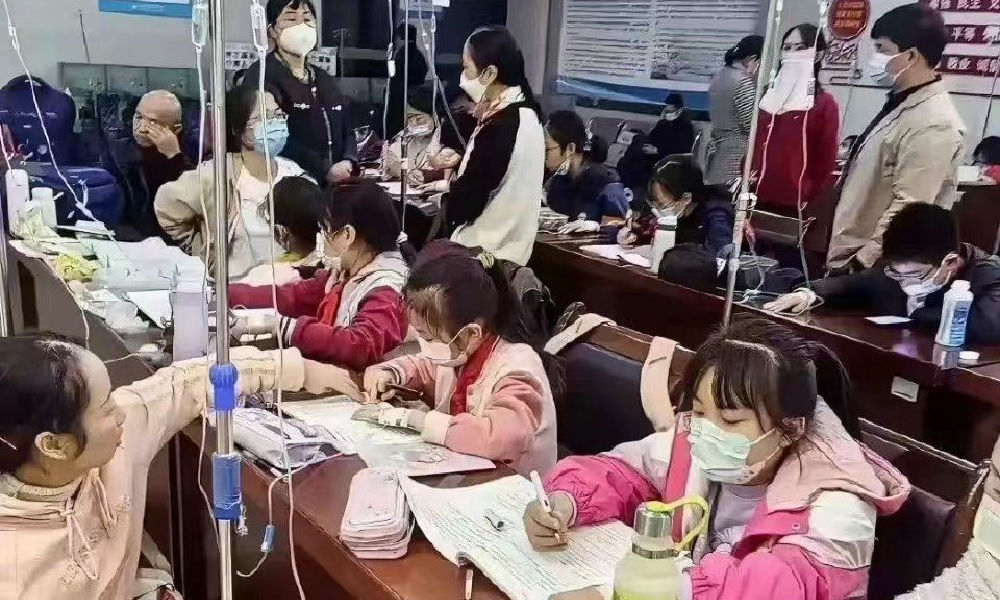
In the early morning of November 21, parents are already queuing up at Xi’an Children’s Hospital with their sons and daughters. It’s not even the line for a doctor’s appointment, but rather for the removal of IV needles.
The scene was captured in a recent video, only one among many videos and images that have been making their rounds on Chinese social media these days (#凌晨的儿童医院拔针也要排队#).
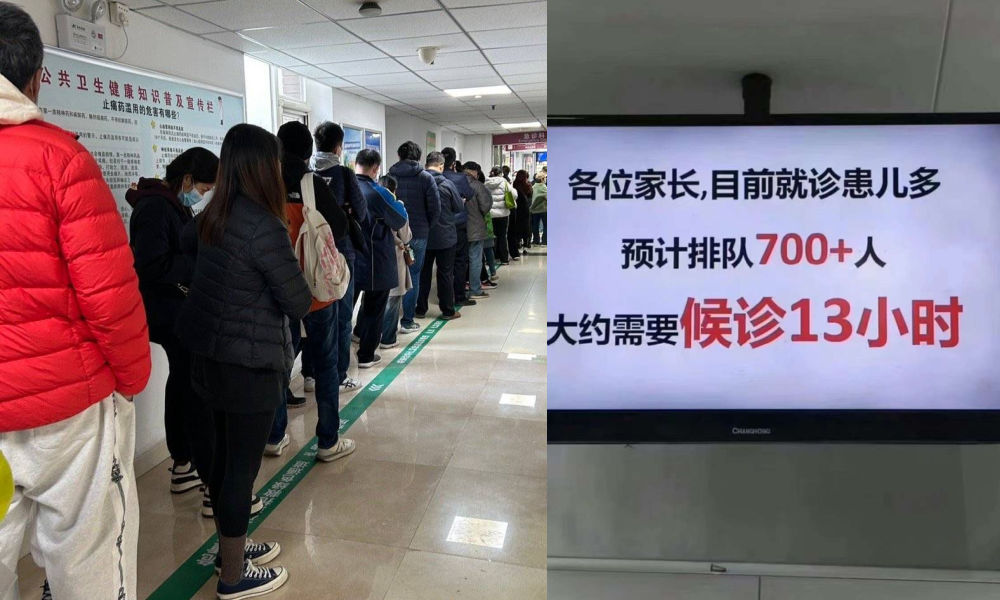
One photo shows a bulletin board at a local hospital warning parents that over 700 patients are waiting in line, estimating a waiting time of more than 13 hours to see a doctor.
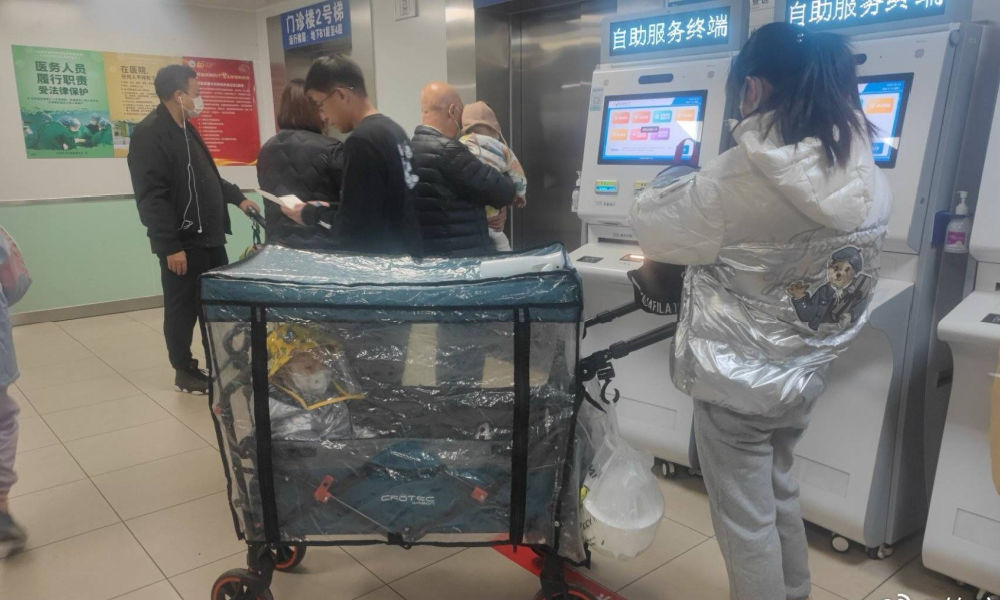
Another image shows children doing their homework while hooked up on an IV.

Recent discussions on Chinese social media platforms have highlighted a notable surge in flu cases. The ongoing flu season is particularly impacting children, with multiple viruses concurrently circulating and contributing to a high incidence of respiratory infections.
Among the prevalent respiratory infections affecting children are Mycoplasma pneumoniae infections, influenza, and Adenovirus infection.
The spike in flu cases has resulted in overcrowded children’s hospitals in Beijing and other Chinese cities. Parents sometimes have to wait in line for hours to get an appointment or pick up medication.
According to one reporter at Haibao News (海报新闻), there were so many patients at the Children’s Hospital of Capital Institute of Pediatrics (首都儿科研究所) on November 21st that the outpatient desk stopped accepting new patients by the afternoon. Meanwhile, 628 people were waiting in line to see a doctor at the emergency department.
Reflecting on the past few years, the current flu season marks China’s first ‘normal’ flu peak season since the outbreak of Covid-19 in late 2019 / early 2020 and the end of its stringent zero-Covid policies in December 2022. Compared to many other countries, wearing masks was also commonplace for much longer following the relaxation of Covid policies.
Hu Xijin, the well-known political commentator, noted on Weibo that this year’s flu season seems to be far worse than that of the years before. He also shared that his own granddaughter was suffering from a 40 degrees fever.
“We’re all running a fever in our home. But I didn’t dare to go to the hospital today, although I want my child to go to the hospital tomorrow. I heard waiting times are up to five hours now,” one Weibo user wrote.
“Half of the kids in my child’s class are sick now. The hospital is overflowing with people,” another person commented.
One mother described how her 7-year-old child had been running a fever for eight days already. Seeking medical attention on the first day, the initial diagnosis was a cold. As the fever persisted, daily visits to the hospital ensued, involving multiple hours for IV fluid administration.
While this account stems from a single Weibo post within a fever-advice community, it highlights a broader trend: many parents swiftly resort to hospital visits at the first signs of flu or fever. Several factors contribute to this, including a lack of General Practitioners in China, making hospitals the primary choice for medical consultations also in non-urgent cases.
There is also a strong belief in the efficacy of IV infusion therapy, whether fluid-based or containing medication, as the quickest path to recovery. Multiple factors contribute to the widespread and sometimes irrational use of IV infusions in China. Some clinics are profit-driven and see IV infusions as a way to make more money. Widespread expectations among Chinese patients that IV infusions will make them feel better also play a role, along with some physicians’ lacking knowledge of IV therapy or their uncertainty to distinguish bacterial from viral infections (read more here)
To prevent an overwhelming influx of patients to hospitals, Chinese state media, citing specialists, advise parents to seek medical attention at the hospital only for sick infants under three months old displaying clear signs of fever (with or without cough). For older children, it is recommended to consult a doctor if a high fever persists for 3 to 5 days or if there is a deterioration in respiratory symptoms. Children dealing with fever and (mild) respiratory symptoms can otherwise recover at home.
One Weibo blogger (@奶霸知道) warned parents that taking their child straight to the hospital on the first day of them getting sick could actually be a bad idea. They write:
“(..) pediatric departments are already packed with patients, and it’s not just Mycoplasma infections anymore. Cases include influenza, Covid-19, Norovirus, and Adenovirus. And then, of course, those with bad luck are cross-infected with multiple viruses at the same time, leading to endless cycles. Therefore, if your child experiences mild coughing or a slight fever, consider observing at home first. Heading straight to the hospital could mean entering a cesspool of viruses.”
The hashtag for “fever” saw over 350 million clicks on Weibo within one day on November 22.
Meanwhile, there are also other ongoing discussions on Weibo surrounding the current flu season. One topic revolves around whether children should continue doing their homework while receiving IV fluids in the hospital. Some hospitals have designated special desks and study areas for children.
Although some commenters commend the hospitals for being so considerate, others also remind the parents not to pressure their kids too much and to let them rest when they are not feeling well.
Opinions vary: although some on Chinese social media say it's very thoughtful for hospitals to set up areas where kids can study and read, others blame parents for pressuring their kids to do homework at the hospital instead of resting when not feeling well. pic.twitter.com/gnQD9tFW2c
— Manya Koetse (@manyapan) November 22, 2023
By Manya Koetse, with contributions from Miranda Barnes
Get the story behind the hashtag. Subscribe to What’s on Weibo here to receive our newsletter and get access to our latest articles:
Spotted a mistake or want to add something? Please let us know in comments below or email us. First-time commenters, please be patient – we will have to manually approve your comment before it appears.
©2023 Whatsonweibo. All rights reserved. Do not reproduce our content without permission – you can contact us at info@whatsonweibo.com.
What’s on Weibo Chapters
Subscribe

Squat or Sit? China’s Great Toilet Debate and the Problem of Footprints on the Seat

Weibo Watch: The Great Squat vs Sitting Toilet Debate in China🧻

Chinese Netizens Turn to Tim Cook Over Battery Factory’s Illegal Overtime

Revisiting China’s Most Viral Resignation Letter: “The World Is So Big, I Want to Go and See It”

The 315 Gala: A Night of Scandals, A Year of Distrust

Our Picks: Top 10 Chinese Buzzwords and Phrases of 2024 Explained

“Dear Li Hua”: The TikTok/Xiaohongshu Honeymoon Explained

Beyond the Box Office: What’s Behind Ne Zha 2’s Success?

Weibo Watch: Christmas in China Is Everywhere and Nowhere

Weibo Watch: A New Chapter

12-Year-Old Girl from Shandong Gets Infected with HPV: Viral Case Exposes Failures in Protecting Minors

15 Years of Weibo: The Evolution of China’s Social Media Giant

Tuning Into the Year of the Snake

The ‘China-chic Girl’ Image and the Realities of China’s Competitive Food Delivery Market

TikTok Refugees, Xiaohongshu, and the Letters from Li Hua
Get in touch
Would you like to become a contributor, or do you have any tips or suggestions? Get in touch here!
Popular Reads
-

 China Insight11 months ago
China Insight11 months agoThe Tragic Story of “Fat Cat”: How a Chinese Gamer’s Suicide Went Viral
-

 China Music12 months ago
China Music12 months agoThe Chinese Viral TikTok Song Explained (No, It’s Not About Samsung)
-

 China Digital10 months ago
China Digital10 months agoChina’s 2024 Gaokao Triggers Online Discussions on AI
-

 China Arts & Entertainment10 months ago
China Arts & Entertainment10 months agoSinging Competition or Patriotic Fight? Hunan TV’s ‘Singer 2024’ Stirs Nationalistic Sentiments





SM AM
January 14, 2023 at 3:50 am
To my knowledge all tourist visa holders and even a few higher classes of visa holders are still indefinitely banned from entering China.
harry lee
January 25, 2023 at 9:51 am
a ban is different from inhumane treatment. Chinese border controls applied to everyone, even their own citizens. the healthcare authorities in UK, Australia and eu (in the case of Italy) all advised against implementing discriminatory measures because such measures are useless. initially, Australia and uk didn’t have requirements for Chinese travelers. they changed their minds last minute. covid testing is absurdly expensive in south korea.